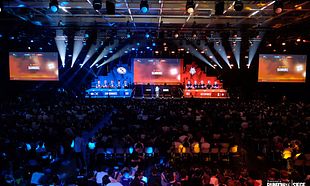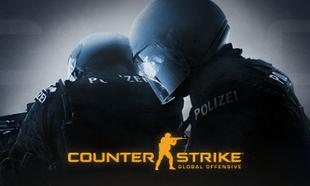At its most basic definition, esports is any multiplayer video game played by professional players in an organised environment.
Since the dawn of the internet, multiplayer gaming within an organised context for prizes has been a thing. The Guinness Book of World Records recognises Dennis Fong, better known by his player name "Thresh", as the world's first professional gamer. In 1997, he defeated Tom "Entropy" Kimzey in a tournament based on the first-person shooter game, 'Quake'.
The tournament, called Red Annihilation, saw players face off in one-on-one matches - otherwise known as 1v1 - for a grand prize of a Ferrari 328GTS belonging to John Carmack, the CEO of id Software, the gaming company which designed 'Quake'.
The event took place at E3 - the Electronic Entertainment Expo - and was closed to public, meaning that only people in the industry, i.e. gaming journalists and fellow developers, were able to see it happen in person. The matches themselves were streamed online, making the tournament one of the first examples of streaming.
Streaming and esports go hand-in-hand, as esports is very much a spectator sport with audiences just as excited and entrenched in particular players and teams as they would in conventional sports. Players and teams typically tend to broadcast their matches and events via Twitch, which is a video streaming service that's used primarily for this. YouTube has begun in recent years to move into this sector, but Twitch is still primarily seen as the preferred avenue for it.
Depending on the games themselves, it's either individual players or teams working together to win a match. In something like 'Street Fighter', it's an individual player who's fighting others to win in a tournament.
For something like 'Overwatch' or 'Counter-Strike: Global Offensive', or 'CS:GO' as it's usually abbreviated, players split into teams and compete against one another in leagues and tournaments. Like any competitive, professional sporting endeavour, the prizes for the victorious vary - and the same goes for the sponsorships.
'Dota 2' has paid out $86 million in prize money across 632 officially registered tournaments. At least 23 players have won over $1 million as of 2016. For 'League of Legends', it goes a step further - they actually pay professional players a salary within their Championship Series. In most cases, the prize money that's on offer comes directly from the developers as their games are specifically tailored for esports.
Another part of esports that's allowed it to become so popular is sponsorship. Like traditional sports, players and teams seek corporate sponsorship and brands use them as avenues to get their products and services in front of consumers. This can mean either the team changes their name to include the sponsor - like SK Telecom T1, which is sponsored by South Korea Telecom - or it can include team uniforms or players using that company's equipment, such as controllers or headsets.
Even traditional sports teams and figures have begun sponsoring and investing in esports teams. Paris Saint-Germain, Galatasary and Fenerbache SK all now field esports teams in the likes of 'FIFA' and 'Pro Evolution Soccer', as well as 'Rocket League' and 'Dota 2'.
If you're starting to think that esports is actually a sport in of itself, what with all the money and sponsorship, there's even controversies of performance-enhancing drugs. Professional players have been known to take drugs such as Adderall, Ritalin and Provigil which increases reaction time and focus, all to give them an edge over their competitors.
It's gotten so bad, in fact, that drug-testing is now common practice in professional tournaments. In 2015, the ESL - the Electronic Sports League - introduced the first drug testing for professional matches. The efficacy of these drugs on players hasn't yet been fully discerned, however anecdotal evidence does tend to suggest that there's an appreciable improvement in reaction time and performance when using these drugs.
While esports may have gone from small LAN parties to full arena tournaments, it's still considered something of a fad and a fringe movement by traditional sporting bodies. That being said, movements towards legitimacy are ongoing. BBC reported last year that the Paris Olympics in 2024 are understood to be "deep in talks" with gaming developers and are close to introducing esports as a demonstration event. In 2022, the Asian Games - which is a sporting event recognised by the International Olympic Committee - will feature esports among other competitive sports.
And that's it for this week's Gamer Explainer! If you've got any suggestions for next week's column, or think we need to make some changes to this article, contact [email protected] with the subject line 'Gamer Explainer' and let us know.









































































